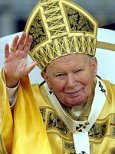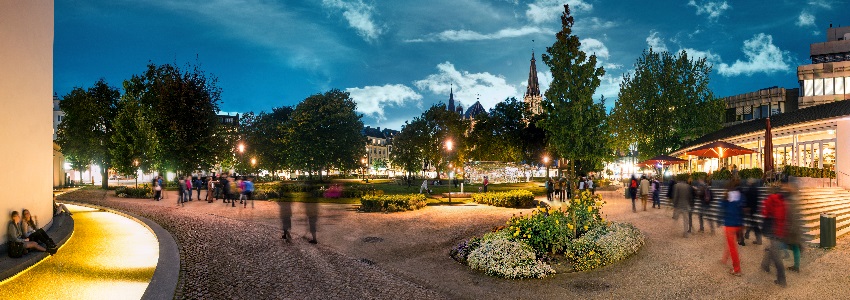Reasons of the Board of Directors for Award of the Extraordinary Charlemagne Prize to His Holiness Pope John Paul II
 The community of values that constitutes Europe is rooted in its common history, its shared experience, and finally its consensus on a culture of life. The foundations for this were laid in the spirit of antiquity, the influence of various religious faiths, and above all in the convictions and strength of Christianity, creating a basis for the development of freedom, mutual respect and tolerance, equality and solidarity.
The community of values that constitutes Europe is rooted in its common history, its shared experience, and finally its consensus on a culture of life. The foundations for this were laid in the spirit of antiquity, the influence of various religious faiths, and above all in the convictions and strength of Christianity, creating a basis for the development of freedom, mutual respect and tolerance, equality and solidarity.
The design of a political, economic and social European Union became possible only thanks to these achievements and to the common identity which has grown up over the centuries.
Today, Europe recognises the challenge of presenting its best spiritual traditions and values to the world, and of making its own creative contribution to shaping the new world order.
The Board of Directors of the Association for the Award of the International Charlemagne Prize of the City of Aachen regards it as a unique and distinctive privilege to present
the Extraordinary Charlemagne Prize
to His Holiness Pope John Paul II.
Pope John Paul II is a prominent and exemplary model of the European values for people throughout the world, embodying in his life respect for the dignity and freedom of humankind, for equality, solidarity and a sense of responsibility for ones fellow human beings. More than any other, he stands for the inalienable nature of human rights and of peace.
His encounters and his dialogue demonstrate that peoples, faiths and cultures can live in harmony with one another, without requiring any person or state to renounce the truth they recognise of their own free will.
His respect for life teaches us to honour creation and in particular its crowning achievement, that is human life.
Pope John Paul II demonstrates in his approach to life that the values and traditions for which Europe has struggled can be of decisive importance in building a new political world order, and that Europe should exert its influence in this direction.
The Holy Father calls upon us Europeans by his example to stand up for these values, in particular for the message of peace in the world.
The personal example and the life’s work of Pope John Paul II are a model for the European process of integration
The basic values that he embodies enable the people of the European Community to identify themselves as Europeans on this common foundation.
In his "programme of life for the whole of Europe", he draws our attention to the fact that the European Union can be an effective unity only if it promotes not only the economic and political values, but above all the spiritual and cultural values.
For him, culture is the common heritage that comes from ethical values and religious experience. For him, culture also means the richness of life, exchange of spiritual traditions and achievements, and mutual creative enrichment. He recommends that states and governments, each acting in their own way, should make their own national and regional contributions to specific expression of unique European culture– while at the same time maintaining respect for diversity. In his message to the European peoples from Santiago de Compostela in 1982, the Holy Father gives this exhortation to Europe:
"Find your way to yourself. Be yourself. Rediscover your origins. Relive your roots… You can continue to be an arc of light for culture and a driving force for progress in the world."
Pope John Paul II has promoted dialogue between the faiths and thus improved the relations between people in a Europe that is changing. He teaches us that a multi-cultural society cannot work without shared constants, without points of orientation and values. If we were to deny that, we would be denying the identity of Europe and would be giving our cultures a profane nature that would deprive them of creativity.
Again and again, His Holiness takes a committed and convincing stand against anti-Semitism.
The Pope made an important contribution to the fall of the iron curtain by his stance, including the political message he conveyed, and thus helped to encourage the process of enlargement and integration for the whole of Europe.
More Information in German.




